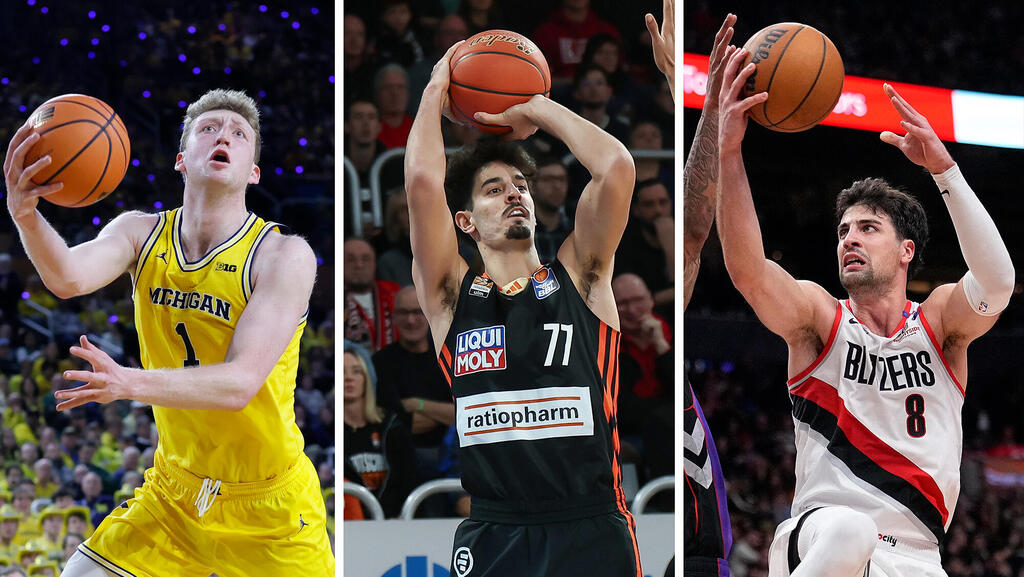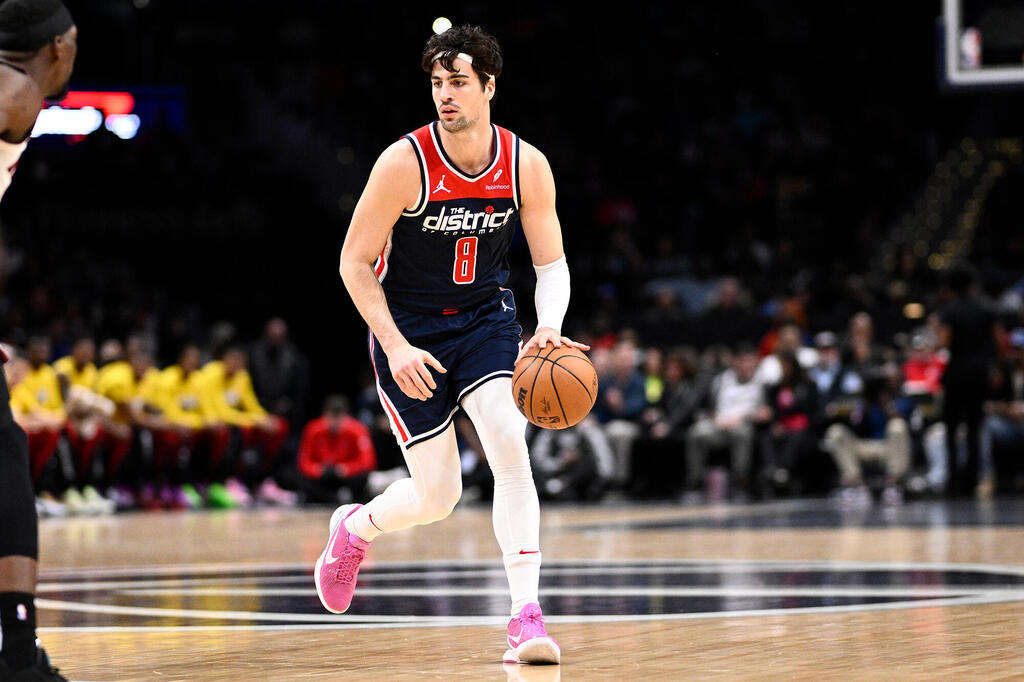If nothing goes wrong, the 2025 NBA Draft—scheduled for the night of June 25–26 at the Barclays Center in Brooklyn—may mark the beginning of a new and almost unprecedented era for Israeli basketball.
“This fall, at least three Israeli basketball players will play in the best basketball league in the world. That’s guaranteed,” says Doron Perkins, who until two seasons ago was an assistant coach at Maccabi Tel Aviv and now serves in the same role with the Cleveland Cavaliers. Perkins, who closely follows young players likely to join the league, adds, “I played and coached in Israel for many years. The amount of talent in your country is truly extraordinary, especially given the population size. But there’s no doubt that this coming summer will be special. In the 2025–26 season, at least two more Israelis will join Deni Avdija. You have good reason to be proud.”
2 View gallery


From left: Danny Wolf, Ben Saraf, Deni Avdija
(Photos: John E. Sokolowski/Reuters, Duane Burleson/AP, Daniel Löb/Reuters)
That prediction, if fulfilled, would be a major breakthrough. Alongside Deni Avdija—who after four seasons with the Washington Wizards made his long-anticipated leap forward this year with the Portland Trail Blazers—two more players holding Israeli passports are expected to be drafted into the NBA: 19-year-old guard Ben Saraf, who grew up in Moshav Gan Yoshia and currently plays for Ratiopharm Ulm in the German Bundesliga; and 21-year-old big man Danny Wolf, born in Glencoe, Illinois, the eldest son of an American Jewish family, who played this season for the University of Michigan.
Another potential candidate is guard Emanuel Sharp (21), son of Maccabi Tel Aviv legend Derrick Sharp. Born in Israel during his father’s playing days and raised in Tampa, Florida, Sharp played for the University of Houston this season and led them to the NCAA finals. “As for Emanuel, I’m not sure,” Perkins continues. “He achieved something incredible with Houston, but I don’t know what next year will look like for him. He might prefer to stay in college and try his luck in the 2026 draft.”
Also in the conversation is Shon Abaev, born in Hadera in 2006, who moved with his family to Florida as a child. Set to play next season for the University of Cincinnati, Abaev last week appeared in the McDonald’s All-American Game—an annual showcase for the best high school talent in the U.S.
“Each of them came through a different path, but they all share the same dream—not only to serve as ambassadors for Israeli basketball, but to represent a new generation that believes anything is possible,” says Hagai Segal, former spokesperson for the Israel Basketball Association. “I believe this draft will mark a historic turning point. It reflects not only personal achievement but also a broader maturity in Israeli basketball—just as we’ve seen in high-tech, Israel is putting itself on the map.”
But it hasn’t always been this way. Two decades ago, basketball reigned supreme in Israeli sports. That same year, Maccabi Tel Aviv—with Pini Gershon on the sidelines and Šarūnas Jasikevicius on the floor—lifted the Euroleague trophy for a second consecutive time. The previous year, Hapoel Jerusalem had claimed the EuroCup. Israel’s national youth teams were also starting to collect European medals. Yet not a single Israeli basketball player had made it to the NBA.
Despite stellar careers, players like Miki Berkovich, Doron Jamchi, Nadav Henefeld, Doron Sheffer, and Oded Kattash, all failed to crack the league. “The fact that I didn’t play in the NBA is the biggest disappointment of my career,” Berkovich once said. “Believe me, my heart still hurts.”
The late NBA commissioner David Stern once said that “the first Israeli in the NBA is now in high school,” estimating it would take another four or five years. That prediction came true in 2009, when Omri Casspi—then a Maccabi Tel Aviv prospect—was drafted 23rd overall by the Sacramento Kings. He became the first Israeli in the NBA and the only one to be drafted in the first round until Avdija. Casspi would go on to play for seven NBA teams over nearly a decade, earning over $18 million.
“The hope that the trickle would become a flood was quickly dashed,” says Sharon Avrahami, coach of Hapoel Gilboa Galil and Israel’s youth team. “It’s not because we don’t produce talent. We do. But the basic physical requirements for NBA-level athleticism—height, strength, explosiveness—aren’t natural resources we have in abundance.”
That’s what made Gal Mekel’s journey so unique. In 2013, he became the second Israeli to reach the NBA, signing with the Dallas Mavericks after a standout season with Maccabi Haifa. Mekel lasted a season and a half before returning to Europe.
It wasn’t until 2020 that the next major milestone occurred: Deni Avdija was selected ninth overall by the Washington Wizards. That same year, Yam Madar was also drafted by the Boston Celtics.
A youth revolution—and its results
“A real revolution took place in the Basketball Association in the past decade,” says Segal. “Pini Gershon was appointed as head of men’s basketball development and also as professional director of all national teams. He introduced new standards and focused on player development and better coordination among coaching staffs.”
The results followed. Israel’s youth teams became success stories, particularly the under-21 team led by Madar and Avdija, which won back-to-back European championships in 2018 and 2019. The youth team will compete this summer in the World U-19 Championship for the first time, and the cadet team has maintained a consistent top-tier European presence.
Saraf’s story illustrates that success was not by chance. As early as third grade, he chose basketball over judo—after preparing a detailed list of pros and cons. “When he chose basketball, he went to the judo club to formally resign,” recalls his elementary school coach Ramon Wolfson. “He showed up in jeans so no one would think he came to train ‘just one more time.’ He was serious—he wanted to be in the NBA, and he decided that’s what would happen.”
He showed extraordinary discipline through high school. “Other kids would slip,” says Wolfson. “But not Ben. He was born an adult. If a coach told him that sleeping at 9:00 p.m. could help him grow, he did it. If the nutritionist said he needed 4,000 calories a day, he followed it to the letter.”
Saraf made professional decisions focused on development, not prestige. He trained at clubs with strong fundamentals, turned down big-name offers, and became a professional player at 16. He later played for Elitzur Netanya and then Kiryat Ata. “People told me I was crazy to give a 17-year-old the keys,” says Avrahami. “But he proved himself.”
His move to Germany was also strategic. Ratiopharm Ulm has a reputation for nurturing young talent, including recent NBA picks. Saraf is playing alongside another projected lottery pick, Frenchman Noah Asenga.
Danny Wolf: From anonymity to draft boards
Wolf’s path was equally remarkable. In 2023, he was buried on Yale’s bench when Eran Atia, Pini Gershon’s right-hand man, discovered him. Wolf joined Israel’s under-21 team as an unknown. “I had the same feeling watching him that I had when Nate Huffman first practiced at Maccabi,” said Gershon. “He sees the court like a guard, but he’s a 7-footer. He makes backdoor passes that some point guards can’t.”
Alongside Noam Yaacov, now with Hapoel Tel Aviv, Wolf led Israel to a silver medal in that tournament. His performance changed everything. He left Yale for Michigan and led the team to the NCAA quarterfinals. Now, he’s expected to be a first-round pick.
High stakes—and high payoffs
The financial implications are significant. Avdija, now entering his sixth NBA season, is the highest-paid Israeli athlete, earning around $10 million this year. If Saraf and Wolf are selected in the first round, they’ll be guaranteed $3–5 million contracts in their rookie seasons, not including endorsements or sponsorships.
Second-round picks, however, face an uphill battle. They are not guaranteed contracts and typically sign two-way deals that split time between the NBA and its minor league affiliate, the G League.
What does this mean for Israeli basketball’s future?
Can this new wave of talent translate into international success—perhaps even a EuroBasket medal? That depends on who you ask. Pini Gershon recently stepped down from his role at the Basketball Association, raising questions about the future of the system he helped build.
“The big question is whether this is a trend or just an unusually talented generation,” says Lior Kaplinsky. “Most of the players entering the NBA didn’t actually grow up in Israel. If we want to keep this going, we need more investment in youth development, more international competition, and more players going abroad to college in Europe or the U.S.”
















